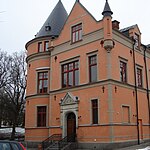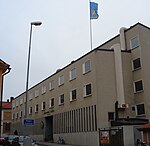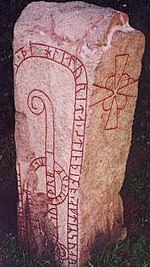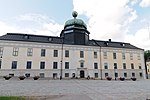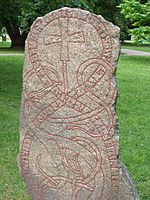The Church of Sweden (Swedish: Svenska kyrkan) is an Evangelical Lutheran national church in Sweden. A former state church, headquartered in Uppsala, with around 5.6 million members at year end 2021, it is the largest Christian denomination in Sweden, the largest Lutheran denomination in Europe and the third-largest in the world, after the Ethiopian Evangelical Church Mekane Yesus and the Evangelical Lutheran Church in Tanzania.A member of the Porvoo Communion, the church professes Lutheranism. It is composed of thirteen dioceses, divided into parishes. It is an open national church which, working with a democratic organisation and through the ministry of the church, covers the whole nation. The Primate of the Church of Sweden, as well as the Metropolitan of all Sweden, is the Archbishop of Uppsala. Today, the Church of Sweden is an Evangelical Lutheran church.It is liturgically and theologically "high church", having retained priests, vestments, and the Mass during the Swedish Reformation. In common with other Evangelical Lutheran churches (particularly in the Nordic and Baltic states), the Church of Sweden maintains the historical episcopate and claims apostolic succession. Some Lutheran churches have congregational polity or modified episcopal polity without apostolic succession, but the historic episcopate was maintained in Sweden and some of the other Lutheran churches of the Porvoo Communion. The canons of the Church of Sweden states that the faith, confession and teachings of the Church of Sweden are understood as an expression of the catholic Christian faith. It further states that this does not serve to create a new, confessionally peculiar interpretation, but concerns the apostolic faith as carried down through the traditions of the church, a concept similar to the doctrine of "reformed and catholic" found within the Anglican Communion.
When Eva Brunne was consecrated as Bishop of Stockholm in 2009, she became the first openly lesbian bishop in the world.Despite a significant yearly loss of members (lately 1-2% annually), its membership of 5,628,067 people accounts for 53.9% (yearend 2021) of the Swedish population. Until 2000 it held the position of state church. The high membership numbers arise because, until 1996, all newborn children were made members, unless their parents had actively cancelled their membership. Approximately 2% of the church's members regularly attend Sunday services. According to a Gallup poll conducted in 2009, 17% of the Swedish population considered religion as an important part of their daily life.


